| Listing 1 - 10 of 354 | << page >> |
Sort by
|
Multi
ISBN: 9090126449 Year: 1999 Publisher: Wageningen Ponsen en Looijen
Abstract | Keywords | Export | Availability | Bookmark
 Loading...
Loading...Choose an application
- Reference Manager
- EndNote
- RefWorks (Direct export to RefWorks)
681.3*I23 --- Deduction and theorem proving: answer/reason extraction; reasoning; resolution; metatheory; mathematical induction; logic programming (Artificial intelligence) --- Theses --- 681.3*I23 Deduction and theorem proving: answer/reason extraction; reasoning; resolution; metatheory; mathematical induction; logic programming (Artificial intelligence)
Multi
ISBN: 9090037713 Year: 1990 Publisher: Delft : Technische Hogeschool Delft,.
Abstract | Keywords | Export | Availability | Bookmark
 Loading...
Loading...Choose an application
- Reference Manager
- EndNote
- RefWorks (Direct export to RefWorks)
681.3*I23 --- Deduction and theorem proving: answer/reason extraction; reasoning; resolution; metatheory; mathematical induction; logic programming (Artificial intelligence) --- 681.3*I23 Deduction and theorem proving: answer/reason extraction; reasoning; resolution; metatheory; mathematical induction; logic programming (Artificial intelligence) --- Fuzzy

ISBN: 4431700099 0387700099 3540700099 9783540700098 9780387700090 9784431700098 Year: 1985 Publisher: Tokyo Springer
Abstract | Keywords | Export | Availability | Bookmark
 Loading...
Loading...Choose an application
- Reference Manager
- EndNote
- RefWorks (Direct export to RefWorks)
681.3*I23 --- 681.3*I23 Deduction and theorem proving: answer/reason extraction; reasoning; resolution; metatheory; mathematical induction; logic programming (Artificial intelligence) --- Deduction and theorem proving: answer/reason extraction; reasoning; resolution; metatheory; mathematical induction; logic programming (Artificial intelligence)
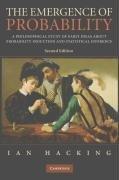
ISBN: 9780521685573 9780521866552 0521866553 0521685575 9780511817557 1107264111 051181755X Year: 2006 Publisher: Cambridge Cambridge University Press
Abstract | Keywords | Export | Availability | Bookmark
 Loading...
Loading...Choose an application
- Reference Manager
- EndNote
- RefWorks (Direct export to RefWorks)
Historical records show that there was no real concept of probability in Europe before the mid-seventeenth century, although the use of dice and other randomizing objects was commonplace. Ian Hacking presents a philosophical critique of early ideas about probability, induction, and statistical inference and the growth of this new family of ideas in the fifteenth, sixteenth, and seventeenth centuries. Hacking invokes a wide intellectual framework involving the growth of science, economics, and the theology of the period. He argues that the transformations that made it possible for probability concepts to emerge have constrained all subsequent development of probability theory and determine the space within which philosophical debate on the subject is still conducted. First published in 1975, this edition includes an introduction that contextualizes his book in light of developing philosophical trends. Ian Hacking is the winner of the Holberg International Memorial Prize 2009.
Philosophy of science --- Probabilities --- Induction (Mathematics) --- Mathematical statistics --- History. --- Arts and Humanities --- Philosophy --- Induction (Logic) --- Mathematics --- Mathematical induction --- Probabilités --- Induction (mathématiques) --- Statistique mathématique --- Histoire --- History
Book
ISBN: 0520038266 0520018664 9780520018662 9780520038264 Year: 1980 Publisher: Berkeley University of California press
Abstract | Keywords | Export | Availability | Bookmark
 Loading...
Loading...Choose an application
- Reference Manager
- EndNote
- RefWorks (Direct export to RefWorks)
INDUCTION (Mathematics) --- Probabilities --- Induction (Mathematics). --- Probabilities. --- Induction (Mathematics) --- Probabilités --- Induction (Mathématiques) --- Probability --- Statistical inference --- Combinations --- Mathematics --- Chance --- Least squares --- Mathematical statistics --- Risk --- Mathematical induction --- Induction (Logic)
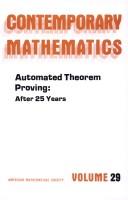
ISBN: 082185027X Year: 1984 Publisher: Providence, RI : American Mathematical Society,
Abstract | Keywords | Export | Availability | Bookmark
 Loading...
Loading...Choose an application
- Reference Manager
- EndNote
- RefWorks (Direct export to RefWorks)
Automatic theorem proving --- -681.3*I23 --- 681.3*I23 Deduction and theorem proving: answer/reason extraction reasoning resolution metatheory mathematical induction logic programming (Artificial intelligence) --- Deduction and theorem proving: answer/reason extraction reasoning resolution metatheory mathematical induction logic programming (Artificial intelligence) --- Automated theorem proving --- Theorem proving, Automated --- Theorem proving, Automatic --- Artificial intelligence --- Proof theory --- Congresses --- 681.3*I23 --- 681.3*I23 Deduction and theorem proving: answer/reason extraction; reasoning; resolution; metatheory; mathematical induction; logic programming (Artificial intelligence) --- Deduction and theorem proving: answer/reason extraction; reasoning; resolution; metatheory; mathematical induction; logic programming (Artificial intelligence) --- Informatique
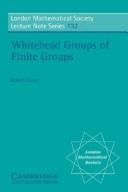
ISBN: 1139884263 1107366267 1107370981 1107361354 1107369320 1299404057 1107363802 0511600658 9781107361355 9780511600654 0521336465 9780521336468 Year: 1988 Publisher: Cambridge Cambridge University Press
Abstract | Keywords | Export | Availability | Bookmark
 Loading...
Loading...Choose an application
- Reference Manager
- EndNote
- RefWorks (Direct export to RefWorks)
This book's aim is to make accessible techniques for studying Whitehead groups of finite groups, as well as a variety of related topics such as induction theory and p-adic logarithms. The author has included a lengthy introduction to set the scene for non-specialists who want an overview of the field, its history and its applications. The rest of the book consists of three parts: general theory, group rings of p-groups and general finite groups. The book will be welcomed by specialists in K- and L-theory and by algebraists in general as a state-of-the art survey of the area.
Whitehead groups. --- Finite groups. --- Induction (Mathematics) --- Mathematical induction --- Induction (Logic) --- Mathematics --- Groups, Finite --- Group theory --- Modules (Algebra) --- Groups, Whitehead --- Abelian groups --- K-theory --- Rings (Algebra)
Book
ISBN: 9780511777110 9781107003637 9781139161381 1139161385 9781139159333 113915933X 0511777116 1283342448 9781283342445 9786613342447 6613342440 1107003636 9781139157568 1139160389 9781139160384 1139155814 9781139155816 1139157566 9781139157568 110722697X Year: 2012 Publisher: Cambridge, UK New York Cambridge University Press
Abstract | Keywords | Export | Availability | Bookmark
 Loading...
Loading...Choose an application
- Reference Manager
- EndNote
- RefWorks (Direct export to RefWorks)
"Induction is a pervasive tool in computer science and mathematics for defining objects and reasoning on them. Coinduction is the dual of induction and as such it brings in quite different tools. Today, it is widely used in computer science, but also in other fields, including artificial intelligence, cognitive science, mathematics, modal logics, philosophy and physics. The best known instance of coinduction is bisimulation, mainly employed to define and prove equalities among potentially infinite objects: processes, streams, non-well-founded sets, etc. This book presents bisimulation and coinduction: the fundamental concepts and techniques and the duality with induction. Each chapter contains exercises and selected solutions, enabling students to connect theory with practice. A special emphasis is placed on bisimulation as a behavioural equivalence for processes. Thus the book serves as an introduction to models for expressing processes (such as process calculi) and to the associated techniques of operational and algebraic analysis"--
Bisimulation. --- Coinduction (Mathematics) --- Modality (Logic) --- Induction (Mathematics) --- Computer science. --- Informatics --- Science --- Mathematical induction --- Induction (Logic) --- Mathematics --- Modal logic --- Logic --- Nonclassical mathematical logic --- Bisimulation --- Mathematical coinduction
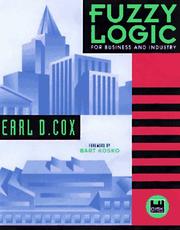
ISBN: 1886801010 9781886801011 Year: 1995 Publisher: Rockland Charles river media
Abstract | Keywords | Export | Availability | Bookmark
 Loading...
Loading...Choose an application
- Reference Manager
- EndNote
- RefWorks (Direct export to RefWorks)
Artificial intelligence. Robotics. Simulation. Graphics --- Mathematical logic --- Fuzzy logic --- 681.3*I2 --- 681.3*I23 --- Artificial intelligence. AI --- Deduction and theorem proving: answer/reason extraction; reasoning; resolution; metatheory; mathematical induction; logic programming (Artificial intelligence) --- 681.3*I23 Deduction and theorem proving: answer/reason extraction; reasoning; resolution; metatheory; mathematical induction; logic programming (Artificial intelligence) --- 681.3*I2 Artificial intelligence. AI
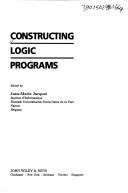
ISBN: 0471937894 9780471937890 Year: 1993 Publisher: Chichester Wiley
Abstract | Keywords | Export | Availability | Bookmark
 Loading...
Loading...Choose an application
- Reference Manager
- EndNote
- RefWorks (Direct export to RefWorks)
Programming --- Mathematical logic --- Logic Programming --- Logic programming --- 681.3*I23 --- Computer programming --- Deduction and theorem proving: answer/reason extraction; reasoning; resolution; metatheory; mathematical induction; logic programming (Artificial intelligence) --- Logic programming. --- 681.3*I23 Deduction and theorem proving: answer/reason extraction; reasoning; resolution; metatheory; mathematical induction; logic programming (Artificial intelligence)
| Listing 1 - 10 of 354 | << page >> |
Sort by
|

 Search
Search Feedback
Feedback About UniCat
About UniCat  Help
Help News
News